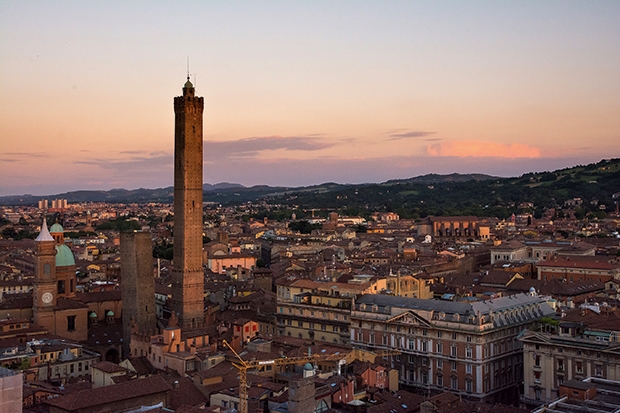Sooner or later, no matter where you are travelling on Italian railways, you are likely to pass through Bologna Centrale. The city is the main junction between the north and south of the country, close to the route through the mountains. It always has been. The teenage Michelangelo stopped off while journeying between Venice and Florence, and — after a contretemps at the customs office, since Bologna was then a city state — carved some small sculptures for the Basilica of San Domenico.
In 1786 Goethe spent a few days in this ‘venerable, learned’ place, ‘thronged with people’. It still is all those things. In the 21st century, however, not too many linger — as Goethe did — to look at the paintings or eat the marvellous food.
Visitors with business in Bologna are another matter. On our first (abortive) visit my wife and I — young and casual — neglected to book a hotel in advance. After much trudging around, in company with an Irish footwear manufacturer who had made the same mistake, it emerged that there was not a free room in the town since this was the week of an enormous shoe fair.
Eventually, years later, we saw Bologna properly in company with the contemporary art duo Gilbert & George. I remember Gilbert — northern Italian in origin — remarking that Venice would be too perfectly beautiful a spot in which to work, whereas Bologna, like Spitalfields where they live, was more creatively invigorating because more grittily workaday.
It is, and it isn’t. The seventh largest town in Italy, Bologna is a commercial centre and, traditionally, a communist stronghold. Perhaps — though the affair is the subject of multiple conspiracy theories — that is why in 1980 the waiting room at the station was the target of a terrorist attack, apparently by neo fascists, which killed 85 people.
The historical core, however, is grand in the renaissance manner: the site of the oldest university in the world, founded in 1088. Two vertiginous towers sprout upwards, the remnants of many others in which medieval Bolognese aristocrats took refuge against attacks by one another. The spacious churches and arcaded streets are built of stone in shades of yellow and red.
For Goethe the greatest attraction of Bologna was the pictures. These days, however, hardly anyone seems to go to the Pinacoteca Nazionale, with its great Raphael and definitive collection of works by Guido Reni, Guercino and the Carracci. Those 17th century Bolognese masters, highly valued by the grand tourists of the 18th century, have fallen from fashion. But that, for the traveller who doesn’t like crowds, is an advantage.
There is the same delightful lack of queues and tour buses in the other towns of Emilia Romagna. Parma, for example, is filled with works by Correggio and Parmigianino (whose nickname just means, ‘the little guy from Parma’). Modena, the next stop on the main line, is the home of Ferrari, Maserati and Lamborghini — but also has a superb Romanesque cathedral and another almost empty museum of masterpieces, the Galleria Estense. There are plenty of reasons, in other words, to take a train from Bologna Centrale.






Comments